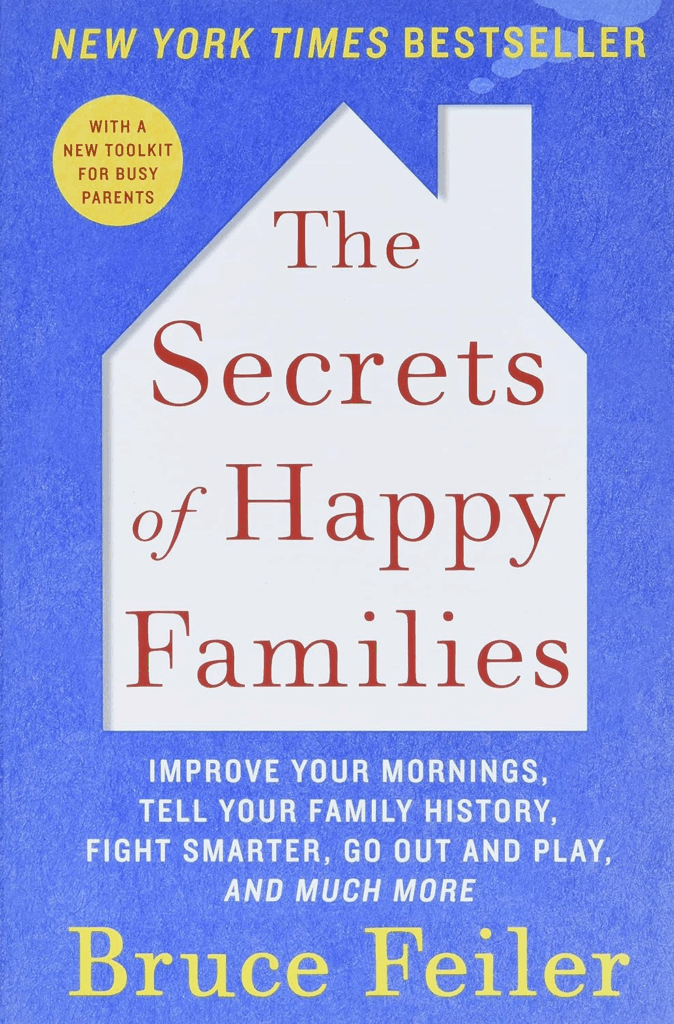Bruce Feiler wrote a book called, “The Secret of Happy Families.” I think it might be helpful to the families I work with every day–families who have or are going through a divorce. In his book, Feiler offers several suggestions that are grounded in research, and what caught my attention was that, while he talks about applying these techniques, or hacks, if you want to call them that, to his family, his wife and twin daughters, I know that they are not uniquely useful to traditional families. In fact, they may be even more important and valuable to separated and divorced families. Often, families of divorce are more stressed than families that have not experienced divorce. Why? Because, when a family is divorced, there is usually only one parent in the home with the children at a time, and so that parent feels that their responsibilities are double, which in turn feels like they have even less time. Feiler’s suggestions are great, though, because they can be used by divorced parents or married parents. What are those suggestions?
- Have a family meeting once a week; it can be only 15-20 minutes, but you talk about what has worked this week and what didn’t, what rewards and/or punishments should be put in place for successes or failures in behavior, for example, and plan what to work on the following week. He said that one 15-20 minute meeting changed his family’s life.
- Talking about your family’s values. In the Collaborative Divorce process, which is my primary professional focus, we talk about the clients’ goals and interests for themselves, their families, and their case. It would be a great addition to add, “What values are important to you and what values do you want to be important to your children?” Even in a divorced family, often the parents do have shared values and can be a united front on developing those values for their children. Feiler says, often, we just assume our children know our values, but he says, it is important not to assume they know our values and the values we want them to have–it is critical to discuss those with them.
- Third, Feiler says, talk, a lot with our families. He says don’t just talk when there is a crisis or a victory. Talk all the time; keep the conversation going. That way, the children will stay in touch and let us know what they are thinking and what we need to know to help them grow into productive and happy people.
- Next, Feiler suggests that we talk to our children about our family history, both sides. He said that research shows that children that know where they came from, their family background, feel more connected. He said there are usually three stories, one where families were successful and lost that financial or other success, some who started with nothing and became successful and those that were oscillating, up and down. He said the oscillating story line will inform children when they hit bumps in their own lives, that their family history is about having ups and down and coming through them.
- Your child’s story. Feiler says we should ask our children, from time to time, to share what their story is, their autobiography, if you will. He said hearing our child’s story, from their perspective, will enable us to learn how to be adaptable to their needs, our family’s needs, and to teach them how to be adaptable, or resilient in life.
- Finally, (not really, Feiler has many more ideas and thoughts), he says that we should not forget to go out and play with our children and families because making happy memories (but really all memories) bind us together as a family.
Bruce Feiler spoke with an audience at Google about these concepts and many more that will help ALL families, single-parent, dual parent or any configuration that makes up your family. I would commend this presentation and discussion he had at Google and his book, “The Secrets of Happy Families,” to you to help you enjoy learning about “The Secret of Happy Families.”
Deborah Gilman, Ph.D., who is a psychologist and Collaborative Coach in the Pittsburgh, PA, area, has published a book that agrees with Dr. Shinnerer and Rich. In her new book, “(Un)Tangled: 52 Co-Parenting Habits to Build Trust, Resolve Conflict and Raise Emotionally Secure Kids After Divorce,” she offers techniques to change habits over a 52-week period, which will help you and your children have a happy family during and after a divorce. I discuss her book more in a blog post recently published on my website.
If you or a friend or family member want to know more about Collaborative Divorce, please contact me at www.milner-law.com, by email at camille@milner-law.com, or by phone at 940-383-2674.












